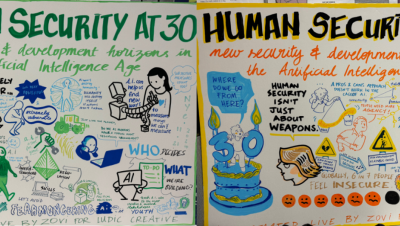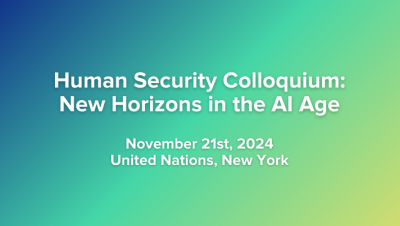Insecurity is inherent to human life. And this world of insecurities is full of incoherence: during the most intense part of the war in Iraq after 2003, many more people died from tobacco than from bombs. The most important shocks for people in Afghanistan come not from conflict but from droughts. People tend to think migrants are to blame for most local crime, but they usually are responsible for a very small share. People fear to be attacked by strangers, but attackers are more often those we already know. Security forces deployed after disasters expect to find chaos and panic, and sometimes act upon this assumption, but normally people behave, queue and share with others. Disasters kill and displace many more people than conflict, but conflict receives more attention, both financial and academic. Why is it that, despite the ever present mantra calling for evidence-based policy making, such incoherence continues?
This is no easy question to answer, but when the world is gearing up for 2015 and a set of Sustainable Development Goals it is interesting to look back 20 years to reflect on a somewhat similar set of conversations. Back then the world was preparing for the World Summit for Social Development, held in Copenhagen in 1995. The stakes were high: “the Social Summit is to review the progress made by humanity in the last 50 years and construct the new architecture of peace and development for the next 50 years” as the Pakistani economist Mahbub ul Haq, chief author of the Human Development Report Office, remarked.
As Special Adviser to the UNDP Administrator, Haq prepared a proposal for the Summit in which he called for a Human World Order, which had as its basis the idea of human security, a concept he had introduced in the 1994 Human Development Report. The ambitious proposal contained five steps and several concrete initiatives. It included a new development model, phasing out the Cold War across the Third World, crafting a new partnership between the North and the South not based on charity, creating a new framework of global governance that included an Economic Security Council, and further empowering civil society. He managed to convince the Danish Prime Minister (though not the UNDP Administrator) to frame his opening remarks as president of the summit in human security terms. Twenty years later very similar discussions continue. What is certain is that Haq’s proposals have had an impact, though partly lagged and indirect; it is also certain that much more remains to be done.
The basic idea of human security came as a reaction to the limited traditional perspective that the State is the main object whose security should be protected and that the military is the main means for achieving this. The 1994 Human Development Report’s propositions echoed existing concerns from experts in security studies and international relations, opening the door for a new realm of practitioners and academics to join the conversation about a fundamental function of society: to provide basic security for everybody. Deeply related to human development thinking, the new security conception was set from the start to include a fuller picture of human beings than from the limited perspective of violence alone, as present in the traditional security perspective.
In a 2013 report (and an associated guidance note for country level analysis) written for the Human Development Report Office which reviewed a selection of national and regional human development reports that deal with human security, and in our Occasional Paper written for the HDR 2014, we point out how the exploration of human security has engendered work in the following areas: from the prevention and resolution of violent conflict, and on crime and ‘citizen security’; passing through research on for example psychological insecurity and on environmental change; to wide-ranging analyses of all the major threats facing a country or region, as well as to the situationally sensitive identification and analysis of selected priority threats in a particular time and place.
Human security research includes themes as varied as investigations into the global decrease in violence, thinking about climate change adaptation, and considering the frequent mismatch between the objective occurrence of different threats and the perceptions we have of them. Human security ideas have enriched discussion and promoted attention to silent crises such as in human trafficking and social exclusion, while questioning the degree of attention and funding given to relatively less significant threats such as terrorism, and the ways that government budgets are allocated.
We began by wondering why so much global debate and decision making remains incoherent in how it deals with insecurity. Perhaps in part it is because so many individuals (but also groups and organizations) are so poor in assessing risk. Why else do so many smoke, for example? But, twenty years on, history shows that the Human Security approach has made progress in reducing the incoherence. The implications of that approach to opening up our way of thinking - and transcending the conventional narrow security narrative - are as important as Haq originally thought. However, the long time scale he suggested for transforming and replacing the conventional narrative is probably realistic, though sobering. Fifty or even a hundred years might be necessary to bring the transformations through which people’s lives are put at the center of security thinking, and whereby most effort will go into tackling the threats that are the most significant in reality rather than those only perceived to be so.
Des Gasper is Professor of Human Development, Development Ethics and Public Policy at the International Institute of Social Studies, The Hague. Recent publications include 'Migration, Gender and Social Justice: Perspectives on human insecurity', co-edited with T.D. Truong et al., and published by Springer (open-access), and “Approaching Development Projects from a Human Development and Capability Perspective,” co-authored with A. Apsan Frediani and A. Boni for the Journal of Human Development and Capabilities (15(1), 1–12). He was a panelist in the UN General Assembly's Thematic Debate on Human Security, June 2014.
Oscar A. Gómez is a researcher based in Japan, currently serving as Deputy Secretary General of the Japan Association for Human Security Studies. His work deals with the theory and practice of human security, emphasizing the environment, health and disasters, with related fieldwork in Colombia, Japan and the Philippines. He has also been involved in several United Nations projects on human security operationalization and diffusion in Latin America. He is now working on human security perceptions in East Asia and the convergence of humanitarian and developmental agendas.
Photo credit: J. Aheram
The HDialogue blog is a platform for debate and discussion. Posts reflect the views of respective authors in their individual capacities and not the views of UNDP/HDRO.


